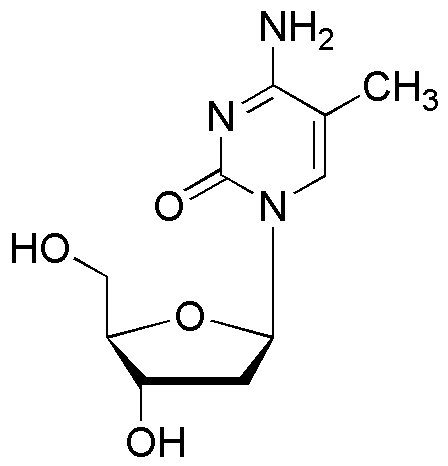5-Methyl-2'-deoxycytidine is widely utilized in research focused on:
- Epigenetics Research: This compound plays a crucial role in studying DNA methylation patterns, helping researchers understand gene regulation and expression.
- Pharmaceutical Development: It serves as a building block for nucleoside analogs, which are essential in developing antiviral and anticancer drugs.
- Biotechnology: Used in the synthesis of modified DNA for gene therapy applications, enhancing the efficacy of therapeutic interventions.
- Diagnostics: Its incorporation into assays aids in the detection of specific DNA methylation changes associated with diseases, providing valuable insights for early diagnosis.
- Research on Cellular Processes: Helps in the investigation of cellular mechanisms such as differentiation and proliferation, contributing to advancements in regenerative medicine.
General Information
Properties
Safety and Regulations
Applications
5-Methyl-2'-deoxycytidine is widely utilized in research focused on:
- Epigenetics Research: This compound plays a crucial role in studying DNA methylation patterns, helping researchers understand gene regulation and expression.
- Pharmaceutical Development: It serves as a building block for nucleoside analogs, which are essential in developing antiviral and anticancer drugs.
- Biotechnology: Used in the synthesis of modified DNA for gene therapy applications, enhancing the efficacy of therapeutic interventions.
- Diagnostics: Its incorporation into assays aids in the detection of specific DNA methylation changes associated with diseases, providing valuable insights for early diagnosis.
- Research on Cellular Processes: Helps in the investigation of cellular mechanisms such as differentiation and proliferation, contributing to advancements in regenerative medicine.
Documents
Safety Data Sheets (SDS)
The SDS provides comprehensive safety information on handling, storage, and disposal of the product.
Product Specification (PS)
The PS provides a comprehensive breakdown of the product’s properties, including chemical composition, physical state, purity, and storage requirements. It also details acceptable quality ranges and the product's intended applications.
Certificates of Analysis (COA)
Search for Certificates of Analysis (COA) by entering the products Lot Number. Lot and Batch Numbers can be found on a product’s label following the words ‘Lot’ or ‘Batch’.
Numéro de catalogue
Numéro de lot/série
Certificates Of Origin (COO)
This COO confirms the country where the product was manufactured, and also details the materials and components used in it and whether it is derived from natural, synthetic, or other specific sources. This certificate may be required for customs, trade, and regulatory compliance.
Numéro de catalogue
Numéro de lot/série
Safety Data Sheets (SDS)
The SDS provides comprehensive safety information on handling, storage, and disposal of the product.
DownloadProduct Specification (PS)
The PS provides a comprehensive breakdown of the product’s properties, including chemical composition, physical state, purity, and storage requirements. It also details acceptable quality ranges and the product's intended applications.
DownloadCertificates of Analysis (COA)
Search for Certificates of Analysis (COA) by entering the products Lot Number. Lot and Batch Numbers can be found on a product’s label following the words ‘Lot’ or ‘Batch’.
Numéro de catalogue
Numéro de lot/série
Certificates Of Origin (COO)
This COO confirms the country where the product was manufactured, and also details the materials and components used in it and whether it is derived from natural, synthetic, or other specific sources. This certificate may be required for customs, trade, and regulatory compliance.


